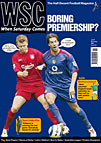 There’s nothing wrong with living in the past: the oldest clubs in England, Scotland and Wales are justly proud of their heritage. But, writes Ian Plenderleith, they can’t agree on who invented the crossbar
There’s nothing wrong with living in the past: the oldest clubs in England, Scotland and Wales are justly proud of their heritage. But, writes Ian Plenderleith, they can’t agree on who invented the crossbar
Fancy boasting that you’re in the same club as Sepp Blatter and Sven-Göran Eriksson? No, it’s not GOAL (the Grand Order of Ageing Lotharios), but the world’s oldest football club, Sheffield FC, founded in 1857 and still very much proud of the fact. And for £2.50 a month you can boast not just an enamel badge and four free tickets to a North Counties East Football League game of your choice, but fellow membership alongside the game’s balding but well tanned elder statesmen.
If that’s not enough, consider that the club is also the only team in the world besides Real Madrid to have won the FIFA Order of Merit. And “what do David Beckham, Johnny Wilkinson and Sheffield FC have in common?” asks FC’s website. Answer: they’re all sponsored by Adidas. Not that they’re trying to trade on the fact that they’re the oldest club in the world or anything. (Did I mention how old they are?)
This hearkening to the past means that the site’s history section is a more interesting read than the latter-day news that Billy Rowley should be fit for the clash with Liversedge. It records that the club was founded by two cricket lovers looking for a way to keep in shape over winter, and that when it was formed its members came up with the game’s first code. It also claims, though somewhat vaguely, to have introduced crossbars and free-kicks to football, although Queen’s Park FC might have something to say on that subject.
“Of all the 42 clubs that make up Scotland’s senior football leagues, only Queen’s Park remains staunchly amateur,” says the Scottish team’s official website, and I swear my screen protruded in a proudly convex way as I read these words. Like Sheffield, Queen’s Park were the first club to form in their country and the only ones to resist professionalism. Like Sheffield, they fell behind the rest, although through grace and favour they’ve somehow stuck around in the senior game.
On the matter of who invented what, however, the Glaswegians are less reticent than their southern counterparts. “As a club, Queen’s Park introduced new concepts into the game such as crossbars, half-time and free-kicks,” they state unequivocally. The lengthy and engaging piece is honest about the club’s later role, too, confessing that it was most likely allowed into senior football’s top division after the Second World War because of Hampden’s capacity. And I had no idea that it was the first Scottish team to appear on television, when a 1951 friendly against Walthamstow Avenue was transmitted. (Imagine today’s Sky commentators: “It’s the big one! The British capital city trans-border clash of the amateurs we’ve all been waiting for!”)
Rather than pursue a quibble about which ancient amateur club in the UK first had the idea to put up a crossbar (which, let’s face it, could hardly have taken a genius), it seems only fair to look at the site of the team claiming to be “unquestionably the oldest football club in Wales”. Step forward NEWI Cefn Druids, formed by Llewelyn Kendrick in 1873 (or 1869, or 1872, or 1876, or even 1992, depending on which incarnation you believe in most, but they’re definitely old) and whose second ever ground was Wynnstay Park, “a ground kindly leased by Sir Watkin Williams Wynno”. It’s diverting to think that their shock 1882-83 FA Cup fourth-round victory over Bolton Wanderers might have been greeted with the headline “Wynno’s Minnow Winners!”
Like Queen’s Park, the Druids, who produced more than 40 Wales internationals, lost many players to professional teams in the early part of the 20th century by remaining amateur and consequently sacrificed in playing status what they gained in moral stature. Now they are stalwart members of the Welsh Premier League, playing at palatial Plaskynaston Lane, a stadium christened in the 1960s with a game against a Manchester United youth team featuring George Best.
If you’re as keen to join them as you doubtless already are to join Sven and Sepp at Sheffield FC, think how cool it sounds to drop in to conversation that you spent last Saturday night down at “the Druids’ social club”. According to the site, “you can be sure of a warm welcome and a friendly atmosphere” at the 2,000-capacity ground. After ten o’clock you might even get to hear club poet Parry Maguire stand on the bar and recite some of his passionate compositions, such as The Mighty Ancients: “Llewelyn Kendrick up in heaven/Watched the lads down Plaskynaston Lane/For he loved the blood and thunder/When Druids laced their boots to play.”
Llewelyn Kendrick, by the way, is the bloke who invented the crossbar. At least that’s what they say in Cefn Mawr.
From WSC 225 November 2005. What was happening this month